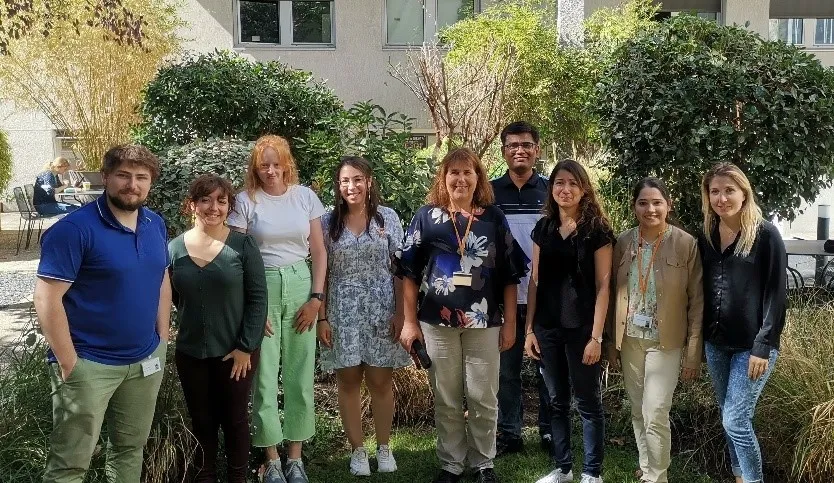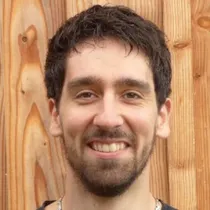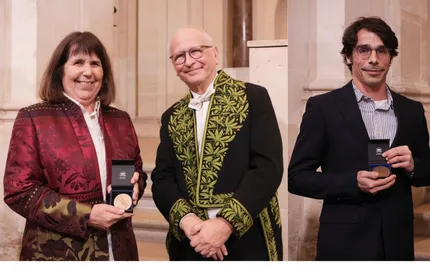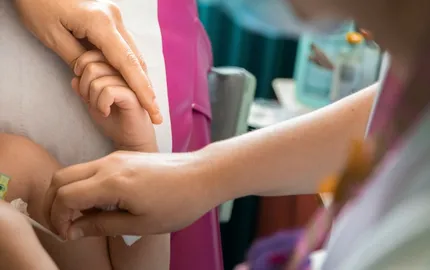Presentation

The main objectives of the RTOP (“Recherche Translationelle en Oncologie Pédiatrique”) research team is to promote translational research in two aggressive pediatric cancers, neuroblastoma (NB) and rhabdoid tumours (RT). Although different genetic alterations drive oncogenesis in NB and MRT, in both pathologies molecular characterization and understanding of the underlying mechanisms leading to the observed phenotype is crucial for the development of new therapeutic approaches.
We address questions of genetic and epigenetic heterogeneity, clonal evolution, and high through-put drug screening including combinations and sequential therapies, with an aim to develop new therapeutic strategies in neuroblastoma and other highly aggressive pediatric cancers.
Furthermore, a focus of the team has been the development of liquid biopsies (ctDNA) as a means of studying clonal evolution and mechanisms of resistance.
The RTOP team identity is shaped by its tight links with the clinical pediatric department (SIREDO Integrated Pediatric Oncology center) to which the PI belongs. The scientific programme is thus also orientated towards clinical applications and the attractiveness of the lab is in addition defined by its interface position between experimental research and clinical applications
Our work
Within our research program, we address questions of genetic and epigenetic heterogeneity, clonal evolution, and high through-put drug screening including combinations and sequential therapies, with an aim to develop new therapeutic strategies in neuroblastoma and other highly aggressive pediatric cancers.
Figure 1 : Overall structure of our research program
The work of my team has focusses on large scale molecular characterization to understand underlying mechanisms leading to an observed phenotype in order to develop new therapeutic approaches, in high risk pediatric cancers and in particular in neuroblastoma (NB). Whole exome/whole genome sequencing, expression profiling, as well as epigenetic profiling of tumor samples, single cell approaches and analyses of sequential liquid biopsies have been used to study clonal versus subclonal genetic events, and to depict the role of clonal evolution in NB progression. Our work during the past years has led to the following highlights:
1) Discovery of the pronostic impact of the overall genomic copy number profile in neuroblastoma patients, and its utility in the clinical management of patients
Relevance : Integration of the genomic copy number profile for patient stratification and determination of treatment intensity in the European protocol for low and intermediate risk neuroblastoma (LINES) and in treatment protocols in the US (Children’s Oncology Group, COG). Based largely on this work, determination of an overall genomic copy number profile in low/intermediate risk neuroblastoma is now considered a standard of care for the clinical management of these patients
2) Role of ALK activating genetic alterations in neuroblastoma patients
Description of the frequency and prognostic impact of ALK genetic alterations in high risk neuroblastoma, and of occurrence of subclonal ALK mutations at diagnosis of neuroblastoma; Discovery of emergence of activating ALK mutations at relapse in neuroblastoma
Relevance : This information is a crucial part of the rational for a trans-atlantic initiative with treatment protocols introducing an ALK inhibitor in the first line treatment, in parallel to standard chemotherapy, for patients with ALK-positive high risk neuroblastoma. These new treatment protocols (COG and SIOPEN) are to be launched in 2021. As chair of the SIOPEN Biology committee I will coordinate the corresponding SIOPEN translational research activities.
3) Role of ALK and MAPK mutations in clonal evolution and tumor progression in neuroblastoma
Relevance : Our results have contributed significantly to the modification of clincial pratice in case of first line treatment failure in neuroblastoma : in the framework of precision medicine programs aiming at the establishment of a molecular profile to identify molecular therapeutic targets after first line treatment failue (MAPPYACTS, INFORM, etc), rather than performing such high through-put molecuar analyses on archival biological material, a new biopsy/ tumor sample obtained at the time of relapse or progression is now considered a standard, when analysing tumor tissue to search for targetable/actionable genetic targets
4) Analyses of circulating tumor DNA documents spatial and temporal tumor heterogeneity in neuroblastoma and other pediatric cancers
Feasibility of the analysis of circulating tumor DNA to study tumor cell-specific genetic alterations; heterogeneity between primary tumor and cirulating tumor DNA; Temporal evolution of molecular genetic alterations
Relevance : Our studies have contributed widely to the demonstration of the usefulness of circulating tumor DNA, isolated from a simple blood sample, to study tumor cell specific alterations ; these approaches now find widespread use in prospective clinico-biological trials in the field of neuroblastoma research
These highlights are also based on a strong implication in national, international and trans-atlantic research networks. These milestones are of major impact, both with regards to clinical management and new clinical trials for neuroblastoma or other high risk pediatric cancer patients, and with regards to the understanding of molecular mechanisms, paving the way for new research projects.
Ongoing research objectives
We will further address questions of genetic and epigenetic heterogeneity, clonal evolution, and to further develop high through-put drug screening including combinations and sequential therapies, with an aim to develop new therapeutic strategies in neuroblastoma and other highly aggressive pediatric cancers. The work in my team is organized in the following axes:
Spatial Tumor Heterogeneity – Study of genetic/epigenetic tumor heterogeneity, including at a single cell level
<Hypermutated neuroblastoma : We have identified 19/150 neuroblastoma cases with an intermediate to high tumor mutational burden (TMB). Mismatch repair genes, or other genes involved in DNA repair, were found to be altered in 5 and 7 cases, respectively. We will analyze this NB subgroup in detail to compare the overall TMB and mutational signatures between primary tumor and relapse, and to search for potentially therapy-induced mutational profiles, and we will apply already established bio-informatics pipelines for neo antigen prediction.
< Study of the role of chromatin remodeling genes in NB: We have recently reported on the possible role of chromatin remodeling genes and in particular SMARCA4 in NB. We will now study in more detail the effect of loss of SMARCA4 in the context of NB, by studying the effects of the re-expression of SMARCA4 in the SKNFI SMARCA4 – cell line in terms of viability and proliferation, cell morphology, gene expression and modifications of the H3K27me3, H3K27ac, and H3K4me3 histone marks.
< Analysis of the role of genetic heterogeneity at a single cell level in neuroblastoma : Genetic heterogeneity at a "single cell" level will be further explored to identify synergistic cellular events, both in the primary tumour and disseminated tumor cells (DTC) in the bone marrow. Single cell RNA (in collaboration with I Janoueix-Lerosey, U830) and single cell DNA sequencing in NB is performed, studying patient samples (primary tumor/bone marrow) and NB PDX (patient derived xenograft) models. ATACseq approaches will be used to compare epigenetic with DNA/RNA information. This work aims at highlighting co-occurrence of genetic alterations at a single cell level, and mechanisms of cooperation between genetically and epigenetically distinct cells.
Temporal tumor heterogeneity and its role in clonal evolution in neuroblastoma
We will pursue our aim of a comprehensive description of genetic alterations observed in a time-dependent manner in neuroblastoma patients, in order to study clonal evolution and its role in tumor progression, as well mechanisms of escape and resistance to treatment. For this we will study cfDNA whole exome sequencing, combined with targeted sequencing, as well as inference of expression profiles by nucleosome footprinting in sequential plasma samples. Our approaches will also be applied to PDX models under targeted or combination treatment. Furthermore we will explore the modulations of epigenetic changes and cellular identity during the disease course in neuroblastoma, using our recently developed technique of ChIPSeq on plasma samples from NB patients, using antibodies against H3K4me3 (epigenetic active mark), H3K27me3 (epigenetic repressive mark), and H3K27ac (epigenetic enhancer mark).
Figure 2 : Clonal evolution studied by sequential cfDNA analysis (Bobin, Iddir et al 2024)
Development and assessment of innovative targeted therapies
In collaboration with the Biophenics platform (Dr Elaine Del Nery, Transfer Department) we have established high though-put drug screening of PDX-derived tumor cells (PDTC) using arrayed drug libraries. We will pursue explore combinations and in particular sequential treatment propositions depending on the genetic profiles of the different models. Based on the hypothesis that the stabilization of G4 by G4-ligands (G4-L) could overcome chemoresistance by synthetic lethality in cells with replicative stress (such as NB with ATRX loss), we will determine the selective sensitivity of both ATRX-LoF and MYCNa NB cell lines to a panel of G4 Ligands, and thus explore the mechanism of synthetic lethality through which G4-L could resensitize NB to standard chemotherapy. Our ultimate goal is to improve current therapeutic approaches in NB by establishing next generation drug sensitivity and resistance profiling in PDTCs.
Prospective clinical studies
In order to provide further insight in to the molecular mechanisms of oncogenesis and possible treatment resistance and tumor progression, the national program MICCHADO (Molecular and immunological Characterization of high risk childhood cancer at diagnosis; PI Gudrun Schleiermacher) aims at a detailed molecular and immunological characterization of children and adolescents with high risk cancer at the time of diagnosis, and follow up of the identified biomarkers in sequential blood samples during treatment and follow up, including study of ctDNA. Launched in 2018, to date we have already enrolled 310 / 600 expected patients in this prospective study.
Molecular characterization within the France Médécine Génomique 2025 Program aims at introducing high throughput sequencing (HTS: WES, WGS and RNAseq) within standard of care. I co-coordinate the national program of FMG2025 HTS for children and adolescents with cancer in treatment failure, with an aim to identify targetable genetic alterations, and I coordinate, on behalf of the French Society of Pediatric Oncology, the introduction of HTS for children and adolescents with cancer at diagnosis.
In summary, the research program of our team focusses in particular on the following aspects :
1. Spatial Tumor Heterogeneity - Study of genetic and epigenetic tumor heterogeneity
Determination of frequency of targetable genetic alterations in neuroblastoma samples
Analysis of the role of genetic heterogeneity at a single cell level in neuroblastoma
2. Temporal heterogeneity
Identification of mechanisms of tumor evolution, and mechanisms of escape and resistance to treatment, based on sequential molecular analyses using circulating biomarkers / liquid biopsies in neuroblastoma
3. Development and assessment of innovative targeted therapies
Study of relevant in vivo models by targeted and combined drug testing and study of clonal evolution in neuroblastoma
4. Prospective clinical studies and trials
Clinical sequencing Programs - Molecular characterization of high risk pediatric cancers: towards a “standard of care” of high throughput molecular characterisation Molecular characterization within the France Médécine Génomique 2025 Program
Development of clinical trials - Development of a COG (USA) – SIOPEN (Europe) transatlantic study introducing ALK targeted treatment in front line treatment in high risk neuroblastoma with ALK genetic alterations

















